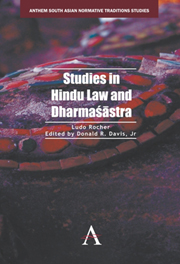Book contents
- Frontmatter
- Contents
- Foreword by Richard W. Lariviere
- Preface
- Abbreviations
- Note on the Edition
- Introduction
- PART ONE THE NATURE OF HINDU LAW
- PART TWO GENERAL TOPICS OF HINDU LAW
- PART THREE HINDU LEGAL PROCEDURE
- The Theory of Proof in Ancient Hindu Law
- The Problem of the Mixed Reply in Ancient Hindu Law
- The Reply in Hindu Legal Procedure: Mitra Miśra's Criticism of the Vyavahāra-Cintāmaṇi
- “Lawyers” in Classical Hindu Law
- Anumāna in the Bṛhaspatismṛti
- PART FOUR TECHNICAL STUDIES OF HINDU LAW
- PART FIVE ANGLO-HINDU AND CUSTOMARY LAW
- Bibliography
- Index
The Theory of Proof in Ancient Hindu Law
from PART THREE - HINDU LEGAL PROCEDURE
Published online by Cambridge University Press: 05 February 2013
- Frontmatter
- Contents
- Foreword by Richard W. Lariviere
- Preface
- Abbreviations
- Note on the Edition
- Introduction
- PART ONE THE NATURE OF HINDU LAW
- PART TWO GENERAL TOPICS OF HINDU LAW
- PART THREE HINDU LEGAL PROCEDURE
- The Theory of Proof in Ancient Hindu Law
- The Problem of the Mixed Reply in Ancient Hindu Law
- The Reply in Hindu Legal Procedure: Mitra Miśra's Criticism of the Vyavahāra-Cintāmaṇi
- “Lawyers” in Classical Hindu Law
- Anumāna in the Bṛhaspatismṛti
- PART FOUR TECHNICAL STUDIES OF HINDU LAW
- PART FIVE ANGLO-HINDU AND CUSTOMARY LAW
- Bibliography
- Index
Summary
The Sources
The main sources for our knowledge of the theory of proof in Hindu law are the numerous treatises on dharma. We could not possibly go into details here of the exact sense of the technical term dharma; we merely want to remind the reader of the important fact that dharma and law are not at all synonyms. As a matter of fact, law constitutes but a very small portion of the much wider concept of dharma; we are not even sure whether, at the outset, the treatises of dharma actually intended also to deal with the matter which we habitually group under the title law.
As a result, we should not be surprised if the data about law in general and about procedure and proof in particular are rather scarce in the oldest texts: the Dharmasūtras, i.e. the treatises written in prose. It would not be possible to reconstruct a coherent system of proof when appealing to no other sources than these Dharmasūtras.
From the beginning of the period of the Dharmaśāstras, all of a sudden the data become much more numerous and complete. In the following pages, we shall have ample opportunity to draw materials even from the older Dharmaśāstras, those of Manu and Yājñavalkya. However, it is not before the Dharmaśāstra of Nārada that we are provided with a more or less comprehensive and systematic survey of the theory of proof. Like its predecessors, the Nāradasmṛti too, has been subdivided according to the eighteen so-called “titles of law” (vivādapadas): still, the treatment of substantive law as a whole is preceded by a triple introduction containing several details on procedure.
- Type
- Chapter
- Information
- Studies in Hindu Law and Dharmasastra , pp. 361 - 394Publisher: Anthem PressPrint publication year: 2012
- 1
- Cited by



